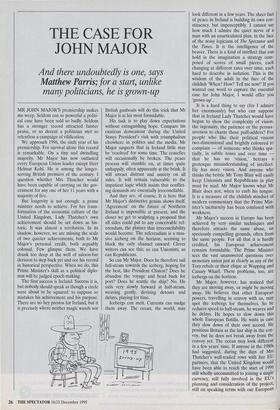THE CASE FOR JOHN MAJOR
And there undoubtedly is one, says
Matthew Parris; for a start, unlike
many politicians, he is grown-up
MR JOHN MAJOR'S premiership makes me weep. Seldom can so powerful a politi- cal case have been sold so badly. Seldom has a stronger record attracted fainter praise, or so decent a politician met so relentless a campaign of vilification.
We approach 1996, the sixth year of his premiership. For survival alone this record is remarkable. On a tiny and dwindling majority, Mr Major has now outlasted every European Union leader except Herr Helmut Kohl. He is among the longer- serving British premiers of the century. I question whether Mrs Thatcher would have been capable of carrying on the gov- ernment for any one of her 11 years with a majority of five.
But longevity is not enough: a prime minister needs to achieve. For her trans- formation of the economic culture of the United Kingdom, Lady Thatcher's own achievement should be set down as his- toric. It was almost a revolution. In its shadow, however, we are missing the scale of two quieter achievements, both to Mr Major's personal credit, both arguably colossal. Few glimpse them. We have drunk too deep at the well of saloon-bar derision to step back yet and see his record in historical perspective. When we do, this Prime Minister's skill as a political diplo- mat will be judged epoch-making.
The first success is Ireland. Success it is, but nobody should speak as though a circle were about to be squared: to suppose so mistakes his achievement and his purpose. There are no hey prestos for Ireland, but it is precisely where neither magic wands nor British gunboats will do this trick that Mr Major is at his most formidable.
His task is to play down expectations without extinguishing hope. Compare his cautious demeanour during the United States President's visit with triumphalism elsewhere in politics and the media. Mr Major suspects that in Ireland little may be 'resolved' for some time. The ceasefire will occasionally be broken. The peace process will stumble on, at times quite unhappily, often apparently at the brink. It will attract distrust and anxiety on all sides. It will remain vulnerable to the impatient logic which insists that conflict- ing demands are essentially irreconcilable.
And they are, of course. It is here that Mr Major's distinctive genius shows itself. `Agreement' on the future of Northern Ireland is impossible at present, and the closer we get to sculpting a proposal that all sides could put to any conceivable ref- erendum, the plainer that irreconcilability would become. The referendum is a mas- sive iceberg on the horizon, seeming to block the only channel onward. Clever writers can see this; so can Unionists, so can Republicans.
So can Mr Major. Does he therefore sail full-steam towards the iceberg, hoping for the best, like President Clinton? Does he abandon the voyage and head back for port? Does he scuttle the ship? No. He sails very slowly forward at half-steam, weaving gently, devising detours and delays, playing for time.
Icebergs can melt. Currents can nudge them away. The ocean, the world, may look different in a few years. The sheer fact of peace in Ireland is building its own con- stituency, but imperceptibly. I cannot say how much I admire the quiet nerve of a man with an unarticulated plan, in the face of the noisy logicians of The Spectator and the Times. It is the intelligence of the beaver. There is a kind of intellect that can hold in the imagination a strategy com- posed of scores of small pieces, each changing at different rates over time, each hard to describe in isolation. This is the wisdom of the adult in the face of the childish 'When? How? Tell me now!' If you wanted one word to capture the essential case for John Major, I would offer you `grown-up'.
It is a hard thing to say (for I admire her enormously) but who can suppose that in Ireland Lady Thatcher would have begun to show the complexity of vision, the ingenuity, the patience or the persua- siveness to charm those puff-adders? For people who like their political visions two-dimensional and brightly coloured to complain — of someone who thinks spa- tially, in subtle tones and over time that he has no 'vision,' betrays a grotesque misunderstanding of intellect. He has more vision. And anyone who thinks the brittle Mr Tony Blair will easily keep Unionists and Republicans in play must be mad. Mr Major knows what Mr Blair does not; when to curb his tongue. It is a measure of the childish mindset of modern commentary that the Prime Min- ister's taciturnity has been confused with weakness.
Mr Major's success in Europe has been achieved by very similar techniques and therefore attracts the same abuse, on speciously compelling grounds, often from the same people. For all that it is hardly credited, his European achievement remains formidable. The Prime Minister sees the vast unanswered questions over monetary union just as clearly as any of the Tory rebels or their clique at Wapping and Canary Wharf. These problems, too, are icebergs on the horizon.
Mr Major, however, has noticed that they are moving away, or might be moving away. He believes that other European powers, travelling in convoy with us, may spot the icebergs for themselves. So he reduces speed to half-steam, he weaves and he delays. He hopes to slow down this whole European flotilla. He waits in case they slow down of their own accord. He positions Britain as the last ship in the con- voy, but he does not break away from the convoy yet. The ocean may look different in a few years' time. If anyone in the 1980s had suggested, during the days of Mrs Thatcher's well-trailed rows with her EU partners, that the United Kingdom would have been able to reach the start of 1996 still wholly uncommitted to joining a single currency, still fully involved in the ElYs planning and consideration of the project, still on speaking terms with our European partners, while having ducked completely out of the Social Chapter and undermining it from the outside, one would have judged the Premier capable of delivering this to be some kind of a master-conjuror.
Instead, people berate him for not pre- cipitating a self-destructive row about a hypothetical future EMU, which grows arguably more distant today than it was in 1990, as we learn to believe it may never happen. European leaders kick themselves for having allowed Mr Major to stitch them up at Maastricht. The British Con- servative press kicks him for not having blown his party apart and handed the TGC negotiations to Mr Blair. It's a weird world.
When, as I expect, the internal contra- dictions of monetary union finally take their toll and the project is sidelined, brass-heads on the Right will crow that this proves they were right all along. But of course it proves they were wrong all along, wrong to try to smash their party early into an iceberg which other currents than theirs would take away. The gradual fading of the federalist nightmare vindicates neither the Tory rebels, nor the Tory Heathites. It vindicates Mr Major, a politician with the courage to believe that time — not weeks but years, maybe a decade — would under- mine the fears of the former and the hopes of the latter. The abuse which has been heaped on his head for this patient strate- gy has been monstrous, but then, unfash- ionably, Mr Major believes that a year is a short time in politics.
The vision which understands that visions fade is the greater vision. What has happened to our ancient and very English regard for the virtues of delay? There was a time, and not so long ago, when 'no comment' could be the most powerful political response, when 'time will tell' was not regarded as an indecisive answer, and when 'wait and see' as a policy could be held to indicate wisdom and maturity in a leader. Since when was it regarded as a weakness to keep competitors, allies and adversaries guessing? Since when was there no wisdom in giving fools a little rope and waiting for them to hang them- selves? Mr Major's European policy is deeply English — positively Elizabethan in its ambiguities. We ought to give him credit for that.
Little appreciated, too, has been Mr Major's holding operation over reform of our post-war cradle-to-grave social securi- ty system. Nobody knows better than he does that this, the greatest of Mrs Thatch- er's unfulfilled projects, must come. Too many fail to grasp, as he grasps, that the time is not quite yet. It would be the worst of misfortunes if the Conservative Party were to go into the next election, and lose it, at each other's throats over a strategy their opponents would characterise as the attempted murder of the welfare state. The electorate are in the mood to believe it. Britain is (we sometimes forget) a democ- racy. Mr Major has rescued the Tories from wrecking a good argument by pushing it too hard and too early. He has saved Mr John Redwood's case for a future Red- wood. He knows its time will come.
But something has happened — I fear it was Mrs Thatcher — to corrupt the appre- ciation intelligent Englishmen used to have of the virtues of understatement, hesitation and occasional silence in the practice of politics. Leading articles in right-wing newspapers these days, anti-European though they may be, read as though trans- lated from the German. It is as if the spirit of Prince Albert — urgently logical, impatient for resolution — were re-infect- ing our political culture.
There is a place for ambiguity in govern- ment. To know when to postpone can be the greatest of wisdoms. Not every battle ought to be fought now, not every cause is best advanced by heavy artillery. Not every crusade pursued with quiet, dogged, patience is pursued the less effectively for that. We seem to have forgotten these things. Mr Major understands them. His presence in Downing Street is an enormous strength to our country during a dangerous and transitional epoch: a quiet force we should appreciate a great deal more if it were ever taken away.











































































































 Previous page
Previous page